Malaysia businesses must be mindful of green goals or risk losing export strength, AmBank Research says
 Malaysia’s businesses must be mindful of green goals as 70% of local exports are channelled to countries committed to net-zero carbon emissions by 2040 to 2050, with Malaysia itself aiming for 2050, said AmBank Research.
Malaysia’s businesses must be mindful of green goals as 70% of local exports are channelled to countries committed to net-zero carbon emissions by 2040 to 2050, with Malaysia itself aiming for 2050, said AmBank Research.
AmBank Research 表示,马来西亚的企业必须注意绿色目标,因为 70% 的本地出口产品流向致力于到 2040 年至 2050 年实现净零碳排放的国家,而马来西亚本身的目标是 2050 年。
AmBank chief economist Dr Anthony Dass said that currently sectors that are “very high” on the environmental, social, and governance (ESG) risk level are the oil and gas, metals and mining as well as coal power generation, which altogether contribute 10% of the country’s gross domestic product (GDP).
AmBank 首席经济学家 Anthony Dass 博士表示,目前环境、社会和治理 (ESG) 风险水平“非常高”的行业是石油和天然气、金属和采矿以及煤炭发电,它们总共贡献了10%该国的国内生产总值(GDP)。
He said next on the "high" ESG risk level are the chemicals, refining and marketing, and agribusiness sectors, which contribute 17% to Malaysia’s GDP.
他说,“高”ESG风险水平的下一个是化工、炼油和营销以及农业综合企业,它们为马来西亚的GDP贡献了17%。
Meanwhile, he listed the sectors on “medium” risk: automobiles, technology hardware, environmental services, forestry, transportation, building materials, aerospace and defence, containers and packaging, home builders and developers and midstream.
同时,他列出了“中等”风险行业:汽车、科技硬件、环境服务、林业、交通运输、建筑材料、航空航天和国防、集装箱和包装、住宅建筑商和开发商以及中游。
“We can see that 70% of our exports go to countries that are committed to net-zero [carbon] emissions by 2040 and some by 2050. Malaysia is into 2050. Can you imagine any Malaysian businesses who do not commit to this, why should clients from outside buy from us?” Dass said at a virtual briefing on market outlook on 3rd June.
“我们可以看到,我们 70% 的出口产品销往那些承诺到 2040 年实现净零 [碳] 排放的国家,还有一些到 2050 年。马来西亚进入 2050 年。你能想象任何不承诺这一点的马来西亚企业吗?为什么外部客户应该向我们购买吗?” Dass在6 月 3 日的市场前景虚拟简报会上表示。
“If the company is in the export market and not moving in this net-zero direction, then your product has difficulties, potentially, to generate bigger market share. And the supply chain that could be [made of] local domestic players will also be affected. In the longer term, it would be a strong negative for Malaysia.”
“如果公司在出口市场并且没有朝着净零的方向发展,那么你的产品可能很难获得更大的市场份额。可能由本地国内参与者组成的供应链也将受到影响。从长远来看,这将对马来西亚产生强烈的负面影响。”
He said the Malaysian government is also moving towards sustainability and ESG development.
他说,马来西亚政府也在朝着可持续发展和 ESG 发展迈进。
“Green financing is the way forward. We work closely with Bank Negara Malaysia (BNM) and with Bursa Malaysia, the government is moving towards sustainability, ESG. To achieve that, we are coming up with policies.
“绿色融资是前进的方向。我们与马来西亚国家银行(BNM)和大马交易所密切合作,政府正朝着可持续发展和 ESG 迈进。为实现这一目标,我们正在制定政策。
“BNM is pushing hard on green financing. And our engagement with Bursa is for Bursa to have a roadmap for listed companies to see how they are moving into ESG, capital raising through green financing,” Dass said.
“国行正在大力推动绿色融资。我们与大马交易所的合作是为了让大马交易所为上市公司制定路线图,以了解他们如何进入 ESG,通过绿色融资筹集资金,” Dass说。
He recommended that businesses in the automotive industry should position in electric vehicles (EVs), as Malaysia aims to have EV charging stations in the entire west coast of Peninsular Malaysia and some in the east coast by 2030.
他建议汽车行业的企业应定位于电动汽车(EV),因为马来西亚的目标是到 2030 年在马来西亚半岛的整个西海岸和东海岸的一些地方建立电动汽车充电站。
He also pointed out that globally by 2040, 90% of vehicles are “supposed” to be EV-related
他还指出,到 2040年,全球 90% 的车辆“应该”与电动汽车相关。
